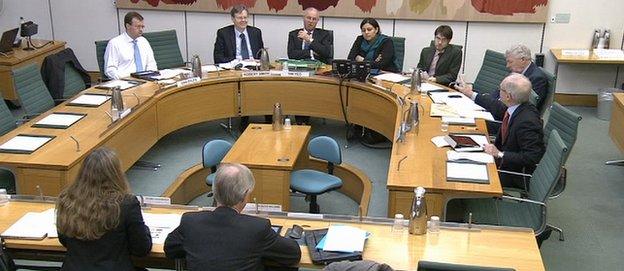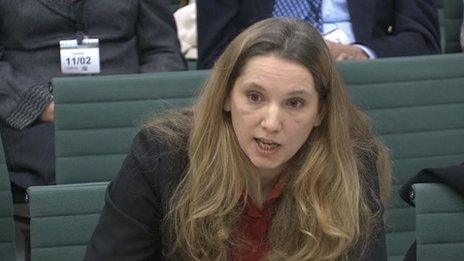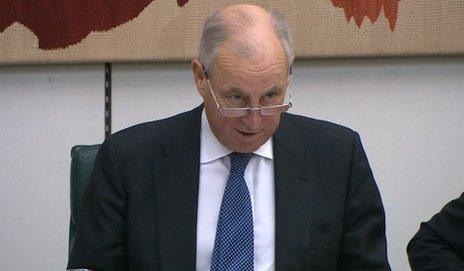MPs Tim Yeo and Peter Lilley in climate committee clash
- Published
MPs Tim Yeo and Peter Lilley in climate change row over witness Dr Emily Shuckburgh
Two Tory MPs have been involved in a spat during a Commons committee hearing into the science of climate change.
The row started after Peter Lilley suggested a leading scientist had given "irrelevant answers" about calculating future global temperature changes.
But his colleague, Tim Yeo, disagreed and said Dr Emily Shuckburgh had given a "thorough and detailed" response.
Asked by Mr Yeo to curtail questioning on the issue, Mr Lilley said this was "absolutely disgraceful".
The flare-up came during a meeting of the Commons energy and climate change committee, external, which is looking at the work of the Intergovernmental Panel on Climate Change (IPCC) and its latest report on the current state of scientific knowledge relating to climate change.
Mr Yeo, who was recently de-selected by his local party as Conservative candidate for the next election, chairs the Commons committee while Mr Lilley - a former cabinet minister under John Major - is a senior member of the committee.

Peter Lilley, right, urges Tim Yeo, third left, not to intervene
The two MPs come from different viewpoints, with Mr Lilley regarded as being much more sceptical about the contribution made by human activity to global climate change.
They were questioning Dr Shuckburgh about scientific modelling of future weather patterns, including global temperature changes.
Dr Shuckburgh is head of the Open Oceans research group at the British Antarctic Survey but is currently on a secondment to the Department for Energy and Climate change.
She is also a member of the Royal Meteorological Society, in which capacity she was giving evidence.
Mr Lilley said a third of the total carbon dioxide emitted into the atmosphere in human history had happened since 1997 and yet it had not resulted in a rise in the surface temperature of the earth.
He asked Dr Shuckburgh if this had reduced, increased or left unaltered her confidence in future projections.
'Measures of heat'
Dr Shuckburgh said the surface temperature was "one measure of heat" in the entire climate system and pointed to "very dramatic" changes elsewhere in the eco-system.
"The last three decades have been successively warmer than each other," she said.

Dr Shuckburgh said her answers were being 'mischaracterised'
"So we have seen strong decreases in Arctic sea ice, we have seen an increase in sea level, we have seen increasing heat content of the ocean, we have seen decreasing snow cover in the northern hemisphere, so other parts of the system have clearly demonstrated changes in temperature."
Mr Lilley went on to suggest that some "expert judgements" about what would happen in the next decade differed from the evidence provided by official climate models.
The academic explained that trying to predict future weather patterns decades ahead was "very challenging" and it was crucial to make clear over what time period any changes were being assessed.
Temperature fluctuations over a "short" period of 15 years could not be expected to determine the "long-term temperature increase one would expect from climate change", she told MPs.
'Multiple evidence'
The IPCC, she added, had made clear that "multiple lines of evidence" had to be taken into account when trying to forecast future temperature changes over the next decade to ensure "robust" forecasts.
"There is a difference between predicting the weather for tomorrow, predicting the temperature over the next decade and predicting the temperature at the end of the century.
"If you are interested in the temperature at the end of the decade, the temperature now is highly relevant. The climate models are designed to project the temperature at the end of the century.
"If you are interested in understanding temperatures over the next decade, you need to draw in other lines of evidence which is exactly what was done in the [IPCC] report."
She added: "It is not a question of expert judgements. It is a case of producing a projection."

Tim Yeo thought the answers were thorough
But Mr Lilley said climate models had been "consistently running too hot" and therefore the IPCC had had to take other "unspecified factors" into account in order to produce a different figure for temperature forecasts.
Accused by the MP of dodging the question, Dr Shuckburgh said she had tried to give a "very specific" answer and suggested the MP was "mischaracterising" her arguments.
Asking Mr Lilley to end his line of questioning, Mr Yeo said he was "completely satisfied" with the answers he had heard, saying Dr Shuckburgh had "gone into great detail" and answered Sir Peter's questions three times.
But Mr Lilley said this was "absolutely disgraceful" and accused his colleague of "protecting a witness who cannot answer a question".
In response, Mr Yeo said might be Mr Lilley's opinion, but "we have given you the opportunity to answer the same question several times and we have had a thorough answer".
- Published9 February 2014
- Published8 January 2014